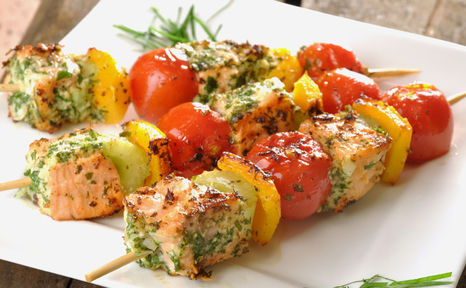

Try These Pain- Fighting Super Foods

Arthritis treatment is aimed at fighting inflammation through the use of anti-inflammatory medications and with good nutrition choices. When it comes to specific foods you should be eating, an anti-inflammatory diet works best for people with arthritis.
Eating these foods can help you to reduce inflammation and minimize arthritis symptoms.
Omega-3 fatty acids, found in fatty fish, are helpful in managing arthritis because they help to reduce the formation of compounds that create inflammation and they also increase the production of good chemicals that limit inflammation. There have been numerous reported cases where arthritis patients who consumed daily omega-3 dietary supplements were able to discontinue high doses of non-steroidal anti-inflammatory drugs or disease-modifying anti-rheumatic drugs, this according to The American Journal of Clinical Nutrition.1
The American Heart Association recommends eating three to four ounces of fish, twice a week, but for people with arthritis, more can help with reducing and preventing inflammation. Some examples of fatty fish that contain high levels of omega-3s include salmon, sardines, anchovies, halibut, tuna, and trout. Fish oil supplements can also offer an advantage to reducing joint pain and swelling for all arthritis patients and disease activity and morning stiffness in rheumatoid arthritis patients.
A study out of the Department of Epidemiology, University of Athens Medical School, Greece established that olive oil may reduce the risk of developing rheumatoid arthritis and minimize inflammation and disease activity in patients who already have the disease.2 This is because olive oil contains oleocanthal, which has been known for its anti-inflammatory properties. Extra virgin olive oil is the best source of oleocanthal since it is less refined and it also retains nutrients as a result of its limited processing. You should add two to three tablespoons per day to your salads and other dishes for the best benefit.
Anti-oxidants are the body’s natural defense system and work to help neutralize free radicals that can damage cells. Fruits and vegetables are loaded in anti-oxidants, and by eating nine or more servings per day, you can help your body to fight inflammation. The best options include colorful foods, such as blackberries, cherries, and strawberries, and greens, including spinach, kale and broccoli.
Nuts are included in the Mediterranean diet, which has been known to reduce inflammation within a few weeks’ time. Nuts are loaded with inflammation fighting healthy fats. Most nuts, especially almonds, are rich in fiber, vitamin E, and calcium. Walnuts are heavy in omega-3 fats. Further, all varieties are loaded with antioxidants.
Beans are loaded with fiber and fiber helps to lower CRP, an indicator that there is inflammation in the body. In addition to being an anti-inflammatory, beans are loaded in antioxidants and are also a great source of protein. Further, they contain folic acid and several minerals including iron and zinc. The recommended amount is two cups per week and the best options are garbanzo, red kidney, pinto and black beans.
Studies have shown that some of the most common spices found on your spice rack are effective in fighting in inflammation. Ginger, turmeric, garlic, cayenne, and onions all have anti-inflammatory properties and they can easily be added to your diet.
Nightshade vegetables, such as tomatoes, potatoes and eggplant, contain solanine, a chemical blamed for causing inflammation and arthritis pain. While there is no scientific evidence to back this up, many arthritis sufferers have reported a decrease of arthritis symptoms once nightshades have been removed from their diets. If you notice that your arthritis flares up after eating nightshades, you can confirm this by cutting all nightshades from your diet for at least two weeks. If you see an improvement in symptoms, you are sensitive to nightshades and avoiding nightshades might help you to reduce pain and other arthritis symptoms.
You can help fight inflammation by staying away from foods that are often associated with inflammation such as processed and fried foods and nightshades, if necessary. If you eat more of the good stuff, such as fish, veggies, fruits, beans, nuts and spices, you can help to decrease the activity of the cox-2 enzyme, which is the main culprit of inflammation. A healthier diet will also help you to lose weight and because fat cells produce cytokines – more stuff that promotes inflammation – losing weight will also help to reduce inflammation in your body.
1 Kremer, JM. (2000, Jan.) “n−3 Fatty acid supplements in rheumatoid arthritis.” The American Journal of Clinical Nutrition. Retrieved from http://ajcn.nutrition.org/content/71/1/349s.full
2 Linos A, Kaklamanis E, Kontomerkos A, et al. (1999, Dec.) “Dietary factors in relation to rheumatoid arthritis: a role for olive oil and cooked vegetables?” The American Journal of Clinical Nutrition. Retrieved from http://ajcn.nutrition.org/content/70/6/1077.long
Copyright © www.orthopaedics.win Bone Health All Rights Reserved